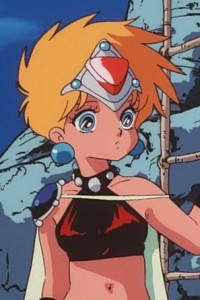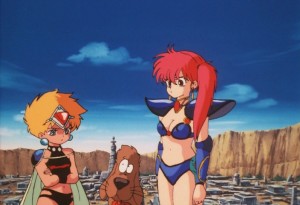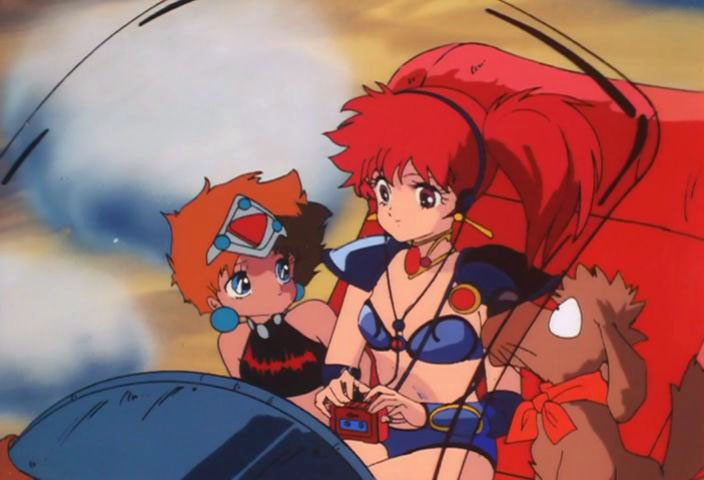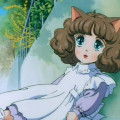The Yohko in the title refers to main character Asagiri Yohko, an ordinary high school girl who composes a piano piece to give her the courage to confess to her crush. She puts this song on a cassette and puts it in her Walkman (that’s how you can tell the movie is from 1985), but right after she fails to confess, she discovers that the song has magical properties that can send her to a whole new world. Can Yohko make her way back to her own world? Or will she fall victim to bad guy Zell who will stop at nothing to make the power of the song his?
Maybe she will, maybe she won’t. But first she falls victim to the show’s fanservice directors, who quickly strip her of her sensible outfit and put her in a skimpy blue bikini for the rest of the show. That’s been the fate of most female fantasy warriors since antiquity, but somehow it’s more disconcerting when the heroine spends the first 30 minutes dressed in sensible fashion only to suddenly TRANS-FORM! into Fanservice Girl after a while.
 But that’s just one minor nitpick with Leda – The Fantastic Adventure of Yohko. It was a pretty good movie for the most part, and short too at only 69 minutes thereabouts. The ‘Leda’ in the title is the name of a legendary goddess/warrior in Ashanty, the world Yohko ends up in, who imbues her with power (and the aforementioned bikini) and a rather ugly mecha as well as the power to fight the forces of evil. Unlike most shows/games of that sort, the legendary goddess never makes an appearance or has a Deus Ex Machina moment. It’s up to Yohko, with the help of talking dog Ringhum and new acquaintance Yoni to do the best she can against the merciless, ambitious (but voiced by Shuuichi Ikeda so I like him) Zell.
But that’s just one minor nitpick with Leda – The Fantastic Adventure of Yohko. It was a pretty good movie for the most part, and short too at only 69 minutes thereabouts. The ‘Leda’ in the title is the name of a legendary goddess/warrior in Ashanty, the world Yohko ends up in, who imbues her with power (and the aforementioned bikini) and a rather ugly mecha as well as the power to fight the forces of evil. Unlike most shows/games of that sort, the legendary goddess never makes an appearance or has a Deus Ex Machina moment. It’s up to Yohko, with the help of talking dog Ringhum and new acquaintance Yoni to do the best she can against the merciless, ambitious (but voiced by Shuuichi Ikeda so I like him) Zell.
It’s a good movie not only because it’s short, but also because it’s focused. That means little to no time is spent on Yohko whining or crying or hesitating to do her duty. She just asks “Okay, what do I have to do to get home?” and then she sets about doing it. Sure she has a few moments of doubt, especially early on, but she’s not your typical crying princess character. She’s stronger than she looks without being headstrong and reckless like the opposite of that trope tends to be. She’s a cool girl.
The focused nature of the movie also extends to the cast, which is really, really small for an anime. There’s Yohko, her two companions, her unnamed faceless crush, Zell, his right-hand man and then lots of robots and assorted henchmen. That’s it. Not only is the cast small, but it’s also largely unexplored. Most people have a backstory, but there’s no real “Why” to it. E.g. Yoni is Leda’s miko, but why would she become one, and why is she still hanging in there when everyone’s gone? You can tell a little bit about the characters by extrapolating – e.g. Yohko is probably from a well-to-do home because she can afford a grand piano and piano lessons and stuff.
 The downside of that focus means that not much time is spent exploring the world of Ashanty, which seems like a pretty interesting place. Zell’s motive for wanting the song is to conquer a new world because he claims Ashanty is dying, but at the end Yoni and Ringham say “Nah, we’ll be all right.” Will they really? Is the world really dying or not? If you like world-building and exploration, The Fantastic Adventure of Yohko isn’t really for you, because it’s exactly what is says on the tin – all about Yohko and virtually nothing else.
The downside of that focus means that not much time is spent exploring the world of Ashanty, which seems like a pretty interesting place. Zell’s motive for wanting the song is to conquer a new world because he claims Ashanty is dying, but at the end Yoni and Ringham say “Nah, we’ll be all right.” Will they really? Is the world really dying or not? If you like world-building and exploration, The Fantastic Adventure of Yohko isn’t really for you, because it’s exactly what is says on the tin – all about Yohko and virtually nothing else.
But what it does do, it does well. A simple story of a girl growing and learning to face up to her problems instead of running away. She’s also learned that she looks pretty fetching in a blue bikini with shoulder pads, and at least two other swimsuits as well, which is important knowledge for life if there ever was some. All in all The Fantastic Adventure of Yohko was an enjoyable watch – decent mix of action and slow moments, small but likable cast, simple story well told. I quite recommend it.




